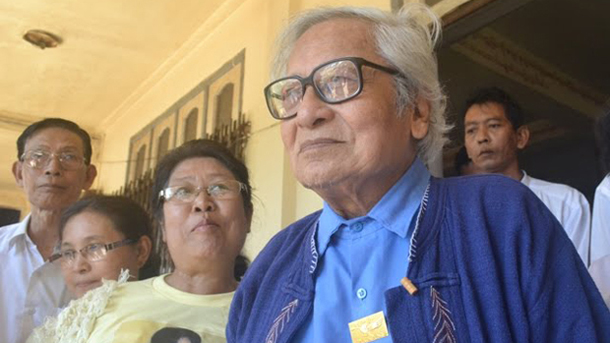The unsettled dispute over the wording of the parliamentary oath saw pro-democracy icon Aung San Suu Kyi’s National League for Democracy (NLD) shun the new parliamentary session that began on Monday.
Despite the Nobel Laureate saying after meeting Italian Foreign Minister Giulio Terzi on Thursday that the dispute was merely a “technical matter,” it has become the biggest political stalemate between the opposition and nominally civilian government since the NLD’s re-entry into mainstream politics earlier this year.
The NLD, which wants to change the military-drafted 2008 Constitution to make it more democratic, has asked Burma’s constitutional tribunal to have the oath changed from “safeguard” to “respect” the Constitution. The oath has to be taken by newly elected members of Parliament including Suu Kyi and her NLD colleagues who won 43 out of the 44 seats they contested in the April 1 by-elections.
Despite the lack of an official announcement on the issue, Suu Kyi told journalists on April 22: “We do not say that we won’t join the assembly, but we are just waiting for the time that will enables us to join in.”
“I think it’s good for the NLD not to join Parliament until our demands to change the wording gets fulfilled,” said senior party member Win Tin. “To amend the Constitution is one of our missions upon taking seats in the national assembly. It’s our principle. If we swear to safeguard the Constitution, how can we implement our mission?”
But Win Tin conceded that some ethnic minority parties have urged the NLD to take their seats first and then try to get 20 percent approval within Parliament for a change to the oath wording.
“Even though we have 20 percent consensus for the proposal, Parliament is heavily dominated by the ruling Union Solidarity and Development party and military personnel,” Win Tin told The Irrawaddy. “It seems formidable for us to then get over 75 percent support [within Parliament] to amend the oath.”
“To amend the Constitution is more important than safeguarding it,” said Min Thu, one of the NLD MP-elects from Naypyidaw. “We are not making a fuss over the use of words. We just want a good start. The word ‘safeguard’ in the oath is a great obstacle for us in our future tasks.”
He added that those who voted for the NLD in the by-elections should not be disappointed by the party’s refusal to join Parliament until the wording gets changed.
“We want to make sure that the oath doesn’t prevent us from serving people—to amend the Constitution. Hopefully our voters are aware of this. Those who are not pleased with our no-show right now may be opportunists who just want to make the most of Daw Aung San Suu Kyi and the NLD,” he said.
While some ethnic minority parties are anxious for the new NLD members to appear in Parliament, there are others who agree with the party’s no-show policy.
“The Kayan New Land Party [KNLP] regards the NLD’s request over the change in wording as fair, and it’s too risky for them to lobby to alter it after taking their seats in Parliament as they are just a minority there. No one can guarantee that the NLD could do it,” said Saw Lwin, the joint-secretary of the KNLP.
“Daw Aung San Suu Kyi made a solemn promise to the public before the by-elections that the NLD would try its best to amend the Constitution,” he added. “But the word ‘safeguard’ in the oath makes that impossible. If the party follows the oath, it means they don’t keep their promise to the public.”
Asked why the NLD made a request to replace the wording on such short notice—just a few days before the resumption of Parliament—Win Tin admitted, “it’s our fault. It came to our notice only at that time.”
He explained that they were focused on party registration when President Thein Sein helped them bend the rules—replacing the original wording of “safeguard” with “respect” the Constitution on the regulations in a similar fashion to the current dispute. The amendment heralded the NLD’s resurrection as an official party and enabled it to take part in the April 1 by-elections.
“We took it for granted that when a law was updated, it would affect other related ones,” said Win Tin. “Now it proves we were mistaken. But the country’s laws should be consistent.”
During a news conference after meeting the Italian Foreign Minister on Thursday, Suu Kyi said she hoped that “the problem will be smoothed over without too much difficulty before too long.”
“We are still hopeful that the president will intervene some way,” said Win Tin. “Apart from his help, we need the support of people and ethnic groups. The international community is surely not pleased with what is happening now. So I think they are seeking a way to tackle this hiccup.”
“We will reach an agreement over the oath issue very soon,” agreed Min Thu. “What we need is cooperation from everyone concerned. It’s ‘all-inclusive politics,’ as Daw Aung San Suu Kyi puts it.
“Now Japan will cancel around 60 percent of Burma’s debt and the EU has decided to suspend sanctions [on Burma] due to the transformation by the government. Surely there are more development loans and a flood of foreign investment in the pipeline. The government doesn’t want to lose them, of course.”
“To the best of my knowledge, Parliament has full authority to replace the wording.” said Saw Lwin. “Daw Aung San Suu Kyi joined the by-elections for the sake of national reconciliation. So the national assembly and government should show their sincerity for national reconciliation by paving a smooth way for her to Parliament. If they refuse to do so, the NLD’s absence in Parliament will not be by the party’s obstinacy, but theirs.”

















